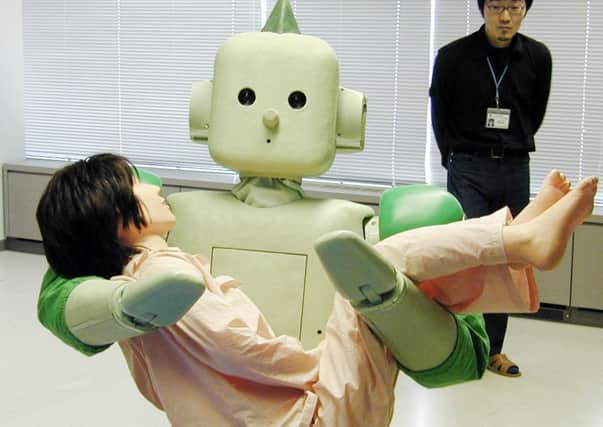Could robot nurses ease the pain at NHS?


ROBOT nurses may soon provide companionship as well as practical care to pensioners according to the UK government strategy for Robotics and Autonomous System. Who else, indeed, will do this for the now 11 million people aged 65 or over in the UK? By 2050 the elderly will comprise 16 per cent of the global population and three-quarters of them will have a care need.
Few human care professionals will be equipped or willing to take this responsibility.
Advertisement
Hide AdAdvertisement
Hide AdThe present surge towards the silver economy targets robotics entrepreneurs to get ready to fill the gap. Our mission, says government innovation specialist, Jackie Marshall-Balloch, is “to demonstrate that through innovations in technology … dependent lifestyles can become an engine for economic growth, leading to a reduction in the financial burden on state”.
The 80 plus age group in the UK represents an expanding market at £ 21.4 billion a year.
Robots are not new in healthcare and are increasingly going into new settings. They assist independence but will using them for nursing companionship assist isolation?
A consortium of European universities and care companies have created Mobiserv, a social companion robot which gives advice on healthy eating, exercise and social activities. The robot, Carebot P37 S65, built by Salford University in Manchester goes further through administering care 24 hours a day and can help those with dementia.
The director of the charity Age UK, Caroline Abrahams, explains: “There is nothing wrong with making smarter use of technology to help people manage health conditions and possibly stay independent for longer.”
She adds: “However, it is always important to ensure technology is only used where it delivers real benefits and to recognise that it is no substitute for the human touch.”
From my own personal experience as a nurse in A&E, I remember some patients arriving via a solitary journey of alarm bells.
Falling, by themselves, onto electronic mats by their beds alerted their faceless intercom service providers to request an ambulance. It was concerning to realise they had not spoken to anyone for weeks.
Advertisement
Hide AdAdvertisement
Hide AdBut nurses too may become devalued as the technological revolution advances seek to replace them with robots. This may be based on two misunderstandings: the nature of the profession of nursing and the nature of compassion.
Our compensation culture, especially in medical negligence, presumes that nurses have a duty to care beyond a task-mentality and that working with compassion is relational.
Prime Minister David Cameron in 2010 claimed that nurse training was too academic and failing patients. Whether the compensation courts or Cameron are right, patients do become distressed when healthcare is delivered without compassion. Nursing cannot be reduced to its many routine tasks. Washing a patient involves assessing their skin integrity, mobility, mood, and having a chat.
While working in an orthopedic ward, a number of years ago, I remember the case of an elderly man with a painful leg ulcer.
Every time I changed his wound dressing we talked about his late wife. His ulcer healed around the first anniversary of her death as he was beginning to cope again. Nurses are not miracle workers but holistic compassionate care is key in all activities of daily living.
What words will the robot use to comfort a woman collecting her dead son’s belongings after a tragic unexpected accident? Robots are only programmed for specific purposes. But this is changing, says Tokyo’s Hasegawa Group, which invented a robot called Asimo that uses technology allowing it to make decisions by searching the internet or asking other robots for help.
This new information gets stored and becomes past experience which the robot can “self-reflect” on in the future. Is this the process which underpins compassionate interaction?
With the rise of social media, smartphones and gaming, society is evolving into deeper contact with robotic artificial intelligence.
Advertisement
Hide AdAdvertisement
Hide AdAt present, this contact is largely voluntary. However, the government assumes that healthcare robots and artificial intelligence appliances will become economic, unavoidable and reliable.
But what will happen if a robot breaks down? What will we do when we too are faced with the reality that only Nurse Ann Droid is on call in accident and emergency?
• Rachel McKenzie, research associate, the Scottish Council on Human Bioethics
SEE ALSO